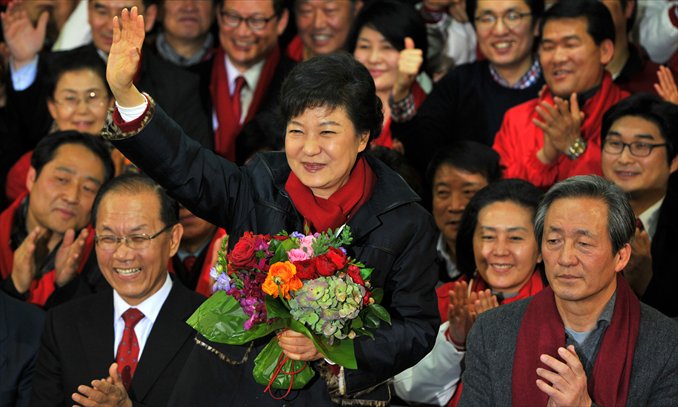Park pulls off historic win

South Koreans are set to see the country's first female president after conservative candidate Park Geun-hye took a slim lead in the ballot tally in Wednesday's toe-to-toe election.
Observers said the new leader is expected to take the middle road in the Korean Peninsula issue and a more open approach with China, unlike her pro-US predecessor Lee Myung-bak.
The 60-year-old Saenuri (New Frontier) Party candidate Park, the daughter of late military ruler Park Chung-hee, won more than 50 percent of votes, the first time this has happened since South Korea adopted a direct presidential election system in 1987.
The higher-than-expected 75.9 percent voter turnout did not give an advantage to the main opposition Democratic United Party contender Moon Jae-in, a former human rights lawyer, who took only 48 percent of the votes.
Park Geun-hye is the oldest daughter of the older Park, who ruled the country for 18 years and lifted it out of poverty but also overlooked human rights.
Having served as the "first lady" after her mother was assassinated by a pro-North gunman in 1974, the new election winner is unmarried and has no children, but promised to take care of the Korean people.
"I will be a president who fulfills all the promises I made," Park told her supporters at a televised celebration held around midnight. "This election is a victory brought by the desire to overcome crisis and for economy recovery."
Kim Jung-gil, 27, an employee of a Samsung Group affiliate, told the Global Times that he was happy about Park's win. "My parents and I all support Park. I think her promises are more realistic."
However, people who didn't support her voiced their disappointment.
"It's a shame that a dictator's daughter was running in the presidential election in the first place," said Choi Eun-ji, 25, a senior student at the Sungshin Women's University based in Seoul.
"Based on her past behavior when her foundation made female staff quit when they were pregnant, I think we would be worse off with Park as the president," added Choi, who will be looking for a job after graduation.
South Korea's new president, who faces a myriad of issues ranging from job creation to North Korea, is likely to take a more active and open approach toward China compared with Lee Myung-bak's conservative administration, experts said.
"Former president Roh Moo-hyun adopted a pro-China policy during his tenure, and his successor Lee was totally pro-US. Both of them went to extremes in their foreign policies," Zhang Jian, a researcher of Asia-Pacific issues at the China Institute of International Studies, told the Global Times.
The North Korean policy will also be altered from Lee's hawkish stance and Roh's "sunshine policy," as both faced harsh criticism in South Korea.
Experts see Park striking a middle path between Roh and Lee.
Although labeled as a conservative figure, Park will seek to differentiate herself from the outgoing Lee as his policy has not been considered successful in South Korea, Zhang said.
But it will take some time for Park to alter Lee's policy in the wake of North Korea's rocket launch last week, said Hwang Jihwan, international relations professor at the University of Seoul. "The rocket launch has created limited options for Park, so it will take some time to see any drastic policy changes from her," Hwang said.
Park first pledged immediate talks with the North but later laid out preconditions for any dialogue.
Park will enter the Blue House for a five-year mandatory single term in February 2013.
Related Articles:
Park Geun-hye should play moderating role
If Seoul is serious about its strategic partnership with Beijing, it should show that goodwill with actions rather than mere lip service.